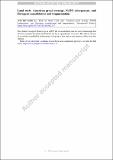Land rush: American grand strategy, NATO enlargement, and European fragmentation
Author(s)
van Hooft, Paul Alexander
Download41311_2020_227_ReferencePDF.pdf (645.3Kb)
Publisher Policy
Publisher Policy
Article is made available in accordance with the publisher's policy and may be subject to US copyright law. Please refer to the publisher's site for terms of use.
Terms of use
Metadata
Show full item recordAbstract
This article argues that NATO enlargement, while stabilizing Central and Eastern Europe, still undermined other aspects of European security over the long term. Throughout the 1990s and 2000s, US administrations pursued three ambitious policies: they expanded NATO, but also its geographic scope, and they ensured that no alternative European security architectures could compete with NATO. Through interviews with US officials, the article shows a preoccupation with instability in Europe and elsewhere, an institutional predisposition to maintaining the centrality of NATO, and a lack of constraints on US policies by Russia or Europe. In the end, these contradictory policies diluted European strategic cohesion and overburdened European militaries, while expanding the commitments inherent to the alliance.
Date issued
2020-03Department
Massachusetts Institute of Technology. Center for International StudiesJournal
International Politics
Publisher
Springer Science and Business Media LLC
Citation
van Hooft, Paul Alexander et al. "Land rush: American grand strategy, NATO enlargement, and European fragmentation." International Politics 57, 3 (March 2020): 530–553 © 2020 Springer Nature Limited
Version: Author's final manuscript
ISSN
1384-5748
1740-3898